This post is written for the Lauren Bacall Blogathon, hosted by In the Good Old Days of Classic Hollywood.
Lauren Bacall in The Big Sleep: A Love Letter
Unlike many of my film-loving friends, when it comes to classic Hollywood, I’m a latecomer to appreciation of Lauren Bacall. When younger, I was a Katharine Hepburn fan and a Bette Davis admirer long before I found my way to Bacall.
Partly, I resisted the Bogey-and-Bacall bait. To younger me, she was young and he was old and craggy, and I hated that he called her “Baby.” (As a teen, I had an older boyfriend who did the same to me; as a budding feminist, I loved his attention but loathed when he used “Baby” in public instead of my name.)
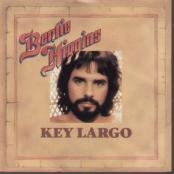 And there was that stupid “Key Largo” song (1981) overplayed on the radio, making me feel even more pressure to agree that Humphrey Bogart and Lauren Bacall were the most amazing couple ever. Back then, I much preferred Fred and Ginger or Katharine Hepburn and Cary Grant for classic Hollywood glamour.
And there was that stupid “Key Largo” song (1981) overplayed on the radio, making me feel even more pressure to agree that Humphrey Bogart and Lauren Bacall were the most amazing couple ever. Back then, I much preferred Fred and Ginger or Katharine Hepburn and Cary Grant for classic Hollywood glamour.
But more recently, my love of hard-boiled fiction and film noir kicked in, and I saw The Big Sleep f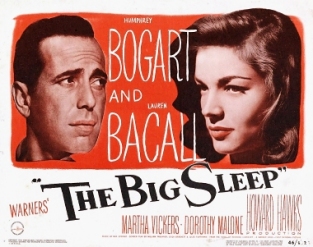 or the first time. I was instantly outraged at my younger self for having judged without seeing Bacall at work. So sharp. So endearing. And so stunning. Bacall had that killer combination of attributes that makes a celebrity, like many of noir’s best women (Stanwyck, Trevor, Hayworth).
or the first time. I was instantly outraged at my younger self for having judged without seeing Bacall at work. So sharp. So endearing. And so stunning. Bacall had that killer combination of attributes that makes a celebrity, like many of noir’s best women (Stanwyck, Trevor, Hayworth).
What woos me about Bacall’s performance in The Big Sleep begins with the fact that her character in the original Raymond Chandler novel, Vivian Rutledge, is selfish and unsympathetic — she requires too much upkeep, Marlowe opines. And that’s 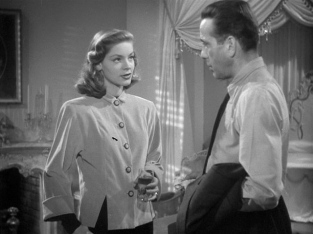 what we see when we first meet her in the 1946 film. She is demanding and unconcerned with any needs but her own. And she stays this way awhile, giving a great femme fatale performance. But she melts, a little at a time, and melts Marlowe’s heart along the way.
what we see when we first meet her in the 1946 film. She is demanding and unconcerned with any needs but her own. And she stays this way awhile, giving a great femme fatale performance. But she melts, a little at a time, and melts Marlowe’s heart along the way.
The original novel ends with Marlowe alone and downhearted. It is Mona (Eddie Mars’ frighteningly devoted wife) that he kisses, not Vivian, when he is tied up. She is the one who releases him, though she stays loyal otherwise to Eddie. In the film, her devotion is dull compared to Vivian’s intensity and complex fear. And though this is partially about the writing, a great deal of it is Bacall.
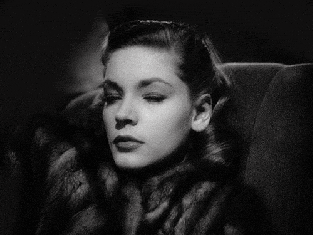 Her deadpan delivery in that low, seductive voice is irresistible. Her Vivian never becomes weak as she yields to emotion, matching Marlowe in brains, wit, and passion. So, when she risks her life for Marlowe and declares her love for him, there is strength not weakness in her declaration. She lands hard-boiled Philip Marlowe and even gets him to bend the law for her sex-addicted, murderous sister without falling into bed with her. Few femmes fatale can boast such a record.
Her deadpan delivery in that low, seductive voice is irresistible. Her Vivian never becomes weak as she yields to emotion, matching Marlowe in brains, wit, and passion. So, when she risks her life for Marlowe and declares her love for him, there is strength not weakness in her declaration. She lands hard-boiled Philip Marlowe and even gets him to bend the law for her sex-addicted, murderous sister without falling into bed with her. Few femmes fatale can boast such a record.
So here’s to you, Lauren Bacall. With this performance, you wooed and won me, too. ❤

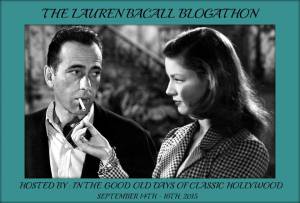
September 13, 2015 at 1:40 PM
Nicely done BNoir, and I’m so glad you came around to seeing the charms of Lauren Bacall. Loved her early persona. Now, tell me ‘Baby’…do you STILL have that older boyfriend? 😉
LikeLiked by 2 people
September 13, 2015 at 3:14 PM
Hell No on the old boyfriend. The hubs is younger than me, feminist, and indulges me in watching noir. 🙂
LikeLike
September 13, 2015 at 3:41 PM
Bacall really was amazing, I am glad you came around. But iknow what you mean about that Key Largo song. Now it’s in my head, thanks 😉I am also glad you found a hubby more your speed!
LikeLiked by 1 person
September 15, 2015 at 3:53 AM
This is a good explanation of what makes Lauren Bacall so good in The Big Sleep. The movie is one of my favorites. I always enjoy reading the stories about how no one could figure out who killed the chauffer. Who cares? I’ll just watch Bogart, Bacall, Elisha Cook, Jr and the rest of the wonderful cast.
LikeLiked by 1 person
September 15, 2015 at 9:11 PM
Yes, I agree with Joe Thompson (previous commenter). You offered an excellent explanation of what makes Lauren Bacall so appealing in this confusing film. She did indeed have that “killer combination of attributes”, as you put it.
LikeLiked by 1 person
September 15, 2015 at 10:56 PM
Thank you! Glad you enjoyed the post.
LikeLike
September 15, 2015 at 10:08 PM
This is my favorite of the Bogart/Bacall films (Dark Passage is second). The film is confusing but really who cares. There is so much going on that it doesn’t matter.
LikeLiked by 1 person
September 15, 2015 at 10:57 PM
My second fav is currently Key Largo. Thanks for commenting!
LikeLike
September 16, 2015 at 5:00 PM
Appreciate your honesty and can certainly relate – I’ve certainly let judgements / preconceptions get in the way of appreciating wonderful actors. I guess you have to remember that most of it’s usually media hype and has little to do with the star in question! I love the points you make about Vivian, in fact I’d go as far to say she’s my favourite Bacall character (disclaimer: I haven’t seen every single one!)
LikeLiked by 1 person
September 24, 2015 at 2:58 PM
Thanks so much for participating in the blogathon. I loved reading your entry.
I would also like to invite you to participate in my next blogathon. The link is below with more details
https://crystalkalyana.wordpress.com/2015/09/24/announcing-the-silent-cinema-blogathon/
LikeLiked by 1 person
September 24, 2015 at 3:08 PM
Well, I thought you might have stumped me here because noir is not a genre of the silents. But I found a pre-noir German silent to write about! It’s called Asphalt. Thanks for including me!
LikeLike
September 24, 2015 at 3:10 PM
Yay. I thought you would come up with something, and I think it’s an excellent choice. Thanks for joining.
LikeLiked by 1 person